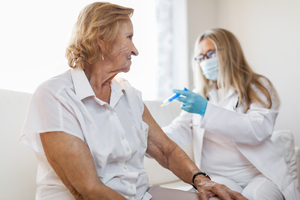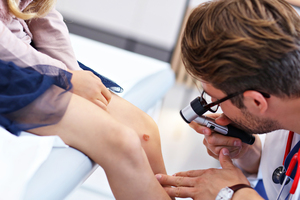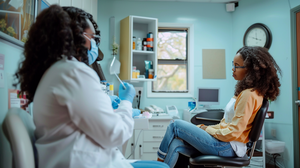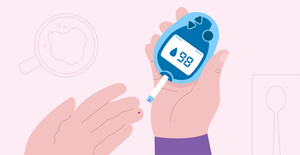Diabetes test near me
in Medon, TN
Own a clinic? Add your location.
Help patients book appointments with you on Solv. It's free!
3 instant-book locations

Urgent Team, Jackson, TN
Urgent Team


Self-pay pricing
Clear self-pay prices
No more surprise bills. Solv is committed to making getting healthcare as easy as buying groceries at the store, including knowing the price of care upfront.
Own a clinic? Add your location.
Help patients book appointments with you on Solv. It's free!
Medon Diabetes Testing
Diabetes tests are used to identify prediabetes, type 1 diabetes, type 2 diabetes, and gestational diabetes. There are several diabetes tests available, however the A1C and FPG tests are the most often used diabetes diagnostic tests.
In diabetes tests, a small sample of your blood is collected and studied at the clinic or sent to a laboratory for further examination. The results of most tests are accessible within minutes or a few hours, depending on the type of test.
Adults in a certain age range or with diabetes risk factors are typically encouraged to get a routine diabetes screening. Between weeks 24 and 28, pregnant women are frequently checked for gestational diabetes to avoid complications such as premature birth and hypoglycemia.
Anyone who satisfies the diabetes risk factors should have a blood test. Diabetes in the family, being overweight or obese, and not getting enough exercise are all common risk factors.
The A1C and random blood sugar testing do not require fasting. Your healthcare expert will take a little sample of blood to examine your blood glucose levels. A1C readings of less than 5.6 percent indicate normal blood sugar levels, 5.7 percent to 6.4 percent indicate prediabetes, and 6.5 percent or higher indicate diabetes. A blood sugar level of 200 mg/dL or greater on a random test indicates diabetes.
You must fast overnight before having your blood drawn for the FPG and glucose tolerance tests. A blood sugar level of 99 mg/dL or less indicates normal blood sugar levels, 100 to 125 mg/dL indicates prediabetes, and more than 125 mg/dL indicates diabetes.
Diabetes Test FAQs
Who should get a diabetes test in Medon?
According to the US Preventive Services Task Force, anyone between the ages of 40 and 70 who are overweight or obese should be evaluated for diabetes every three years. For those 45 and older, as well as adults under 45 with significant diabetes risk factors, the American Diabetes Association recommends a yearly diabetes screening. High blood pressure, a family history of diabetes, and being overweight or obese are just a few of the many risk factors for diabetes.
How do they test for diabetes in Medon?
Diabetes can be detected with a simple blood test. Many practitioners use the A1C test or a private fasting plasma glucose (FPG) test to diagnose diabetes. The A1C test measures your blood sugar over the previous two or three months, whereas the FPG test measures your blood sugar following an overnight fast. The results of the A1C test are ready in minutes, whereas the results of the FPG test are usually available in a few hours.
What is the blood test for diabetes?
The A1C blood test and the fasting plasma glucose (FPG) test are the two most used diabetes diagnostics. The A1C test is also known as the HbA1C test, hemoglobin A1C test, or glycated hemoglobin test. This test allows you to eat and drink before the test, but the FPG test requires you to fast for at least eight hours prior to the test and only drink sips of water until it is completed.
How much does a diabetes test cost in Medon?
Diabetes testing is covered by many health insurance programs. Calling your insurance carrier directly to find out how much diabetes testing would cost you is the simplest way to find out. Free Medon diabetes screenings are available in several pharmacies, health fairs, community centers, and large stores that provide drugstore services. If you do not have health insurance, inquire about the cost of diabetes testing with your doctor or local drugstore.
Is a diabetes test covered by my insurance?
Most health insurance plans will cover diabetes testing and diagnosis. Contact your health insurance provider directly to learn more about your coverage and any fees related with diabetes testing. If your insurance plan does not cover diabetes testing, ask your local Medon pharmacies and drugstores about free or low-cost testing possibilities.
Where can I get a diabetes test in Medon?
A number of primary care physicians can perform diabetes testing. In some situations, your doctor may recommend you to a diabetic specialist called as an endocrinologist. Testing for diabetes is also available through pharmacies, outpatient laboratories, health fairs, and community centers. Speak with your healthcare provider to learn more about where to receive an accurate and reliable diabetes test.
Can I get a same-day appointment for a diabetes test in Medon?
Same-day diabetes testing is available at many walk-in clinics and urgent care centers. Diabetes testing may be accessible the same day at pharmacies and retail locations that sell both over-the-counter and prescription medications. Contact your healthcare provider or local walk-in clinics to learn more about same-day diabetes testing options and pricing.
How can I book a diabetes test on Solv?
You can use Solv to identify local healthcare providers in your area who can perform diabetes testing. Type "diabetes test" into the search bar, then enter your location and a time for your appointment. Solv will then present you with a list of local providers and their contact information, allowing you to book an appointment right away.
Can I test myself for diabetes at home?
Diabetes cannot be diagnosed at home, but once diagnosed, you can monitor your blood sugar levels. Glucose test strips, glucose meters, and lancet devices are all common blood glucose testing for diabetics. Schedule a diabetes test with your healthcare provider if you suspect you have diabetes and want to be properly diagnosed.
What type of doctor treats diabetes?
Diabetes is usually treated and managed successfully by a general practitioner. Some doctors may refer you to an endocrinologist, a specialist in endocrine system disorders such thyroid problems, infertility, and diabetes. Inquire with your doctor about diabetic services and whether you need a referral to an endocrinologist who specializes in the management of this chronic illness.

Updated on Nov 25, 2025
Solv has strict sourcing guidelines and relies on peer-reviewed studies, academic research institutions, and medical associations. We avoid using tertiary references.
Related Searches
DOT Exam in Medon
Ear Wax Removal in Medon
Sports Physicals in Medon
A1C Test in Medon
Allergy Testing in Medon
Basic Metabolic Panel in Medon
CMP Test in Medon
Diabetes Test in Medon
Diagnostic Test in Medon
Glucose Test in Medon
H Pylori Test in Medon
Hepatitis test in Medon
Lab Tests in Medon
Mono Test in Medon
Pregnancy Test in Medon
RSV Test in Medon
STD Testing in Medon
Strep Test in Medon
TB Test in Medon
Thyroid Test in Medon
Vitamin D Test in Medon
Aetna Urgent Care
Blue Cross Blue Shield Urgent Care
Cigna Urgent Care
COVID-19
Flu
United Health Urgent Care
» All services in MedonFind diabetes test
Nearby cities
Everyday Healthcare, Simplified
Expert advice to help you live your best life







